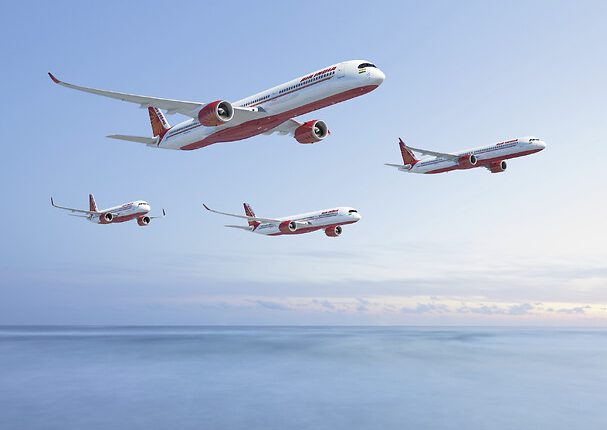Paris – Air India has firmed up its order for 250 Airbus aircraft and selected an Airbus maintenance and digital package to power the airline’s transformation and growth strategy.
The aircraft order includes 140 A320neo and 70 A321neo single-aisle aircraft as well as 34 A350-1000 and six A350-900 wide-body jets. The airline had signed a Letter of Intent to acquire these aircraft in February 2023.
Air India will also be counting on Airbus to help ensure the highest level of fleet availability with the Integrated Materials Solutions (IMS) from Satair, an Airbus company. The Airbus-powered maintenance solution will ensure that every time the airline needs a rotable or a consumable part, it is readily available and stocks are automatically replenished. And in its transformation and digitalisation journey, Air India will be the launch customer for Airbus’ Skywise Core X3, the latest and most advanced aviation analytics platform. This once again demonstrates the avant-garde cooperation between Airbus and Air India.
The purchase agreements for the aircraft as well as the Letters of Intent for maintenance and digital services were signed in the presence of N. Chandrasekaran, Chairman of Tata Sons and Air India, Campbell Wilson, CEO & MD of Air India, Guillaume Faury, Airbus CEO, Christian Scherer, Airbus Chief Commercial Officer and Head of International, and Rémi Maillard, President and Managing Director, Airbus India and South Asia at the Paris Air Show 2023.
Campbell Wilson, CEO & MD, Air India, said: “Our ambitious fleet renewal and expansion programme will see Air India operate the most advanced and fuel-efficient aircraft across our route network within five years. We are proud to be working with all our partners, including Airbus, in this journey to rebuild a global airline which reflects India taking a more confident posture around the world.”
“We are excited to be a key partner in the renaissance of the Flying Maharaja. Under the leadership of the Tata Group and a focussed new management, this is one of the most ambitious projects in the airline business today. We are proud that the efficiencies, comfort and range capability offered by our latest generation aircraft will contribute to the process, as Air India reclaims its rightful position as a world-class premium carrier. The Airbus services package is a perfect future-oriented choice that will form a core element of Air India’s transformation,” said Christian Scherer, Chief Commercial Officer and Head of International at Airbus.
The historic Air India order marks the entry into service of the A350 in India, the world’s fastest growing aviation market. The all-new, long-range aircraft will help unlock the pent-up potential of India’s long-haul market, its technology, reach and second-to-none comfort enabling new routes and passenger experience with better economics and enhanced sustainability. Alongside the A350s, the A320 Family fleets will be the efficient, versatile asset to continue democratising and decarbonising air travel in India – from domestic, regional, up to international levels. Deliveries are set to commence with the first A350-900 before the end of 2023.
The A350 is the world’s most modern and efficient wide-body aircraft in the 300-410 seater category. The A350’s clean sheet design includes state-of-the-art technologies and aerodynamics delivering unmatched standards of efficiency and comfort. Its new generation engines and use of lightweight materials delivers a 25 percent advantage in fuel burn, operating costs and carbon dioxide (CO2 ) emissions, compared to previous generation competitor aircraft.
The aircraft offers a 3-class configuration cabin that is the quietest of any twin-aisle and offers passengers and crew the most modern in-flight products for the most comfortable long-range flying experience.
The A321neo is the longest-fuselage member of Airbus’ best-selling, single-aisle A320 Family, comfortably seating 180 to 220 passengers in a typical two-class layout, and as many as 244 in a higher-density arrangement. The A320neo has already set the standards as the world’s most comfortable short-to-medium-haul aircraft that typically accommodates from 140 to 170 passengers, with a maximum capacity of up to 180 travellers. Its environmental performance allows for at least 20 per cent less fuel burn and CO2 emissions as well as 50 per cent noise footprint reduction, compared to previous generation aircraft.


Comments are closed.